|
|
KERRANG Magazine - January 20,
1990
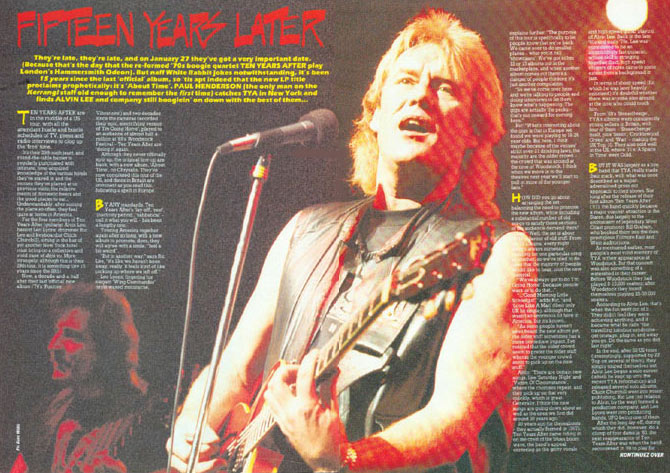
They're
late, they're late, and on January 27 they've got a very
important date.
(Because that's the day that the
re-formed '70's boogie quartet TEN YEARS AFTER play
London's Hammersmith Odeon).
But naff White Rabbit jokes
notwithstanding, it's been fifteen years since the last
"official" album, so 'tis apt indeed that the
new LP title proclaims prophetically: it's "About
Time". PAUL HENDERSON (the only man on the
Kerrang! staff old enough to remember the first
time)
catches TYA in New York and finds ALVIN LEE and company still
boogiein' on down with the
best of them…
TEN
YEARS AFTER are in the middle of a
U.S.A. tour, with all the attendant hustle and bustle
schedules of T.V. press and radio interviews to clog up
the "free" time.
It's their twenty-ninth such
jaunt, and round-the-table banter is regularly
punctuated with intimate, time acquired knowledge of the
various hotels they've stayed in and the venues they've
played at on previous visits; the relative merits of
domestic beers and the good places to eat…
Understandably, after visiting the place so often, they
feel quite at home in America.
For the four members of
Ten Years After (guitarist Alvin Lee, bassist Leo Lyons,
drummer Ric Lee and keyboardist Chick Churchill),
sitting in the bar of yet another New York hotel must
bring on a collective and vivid case of déjà vu. More
strangely, although this is their 29th tour, it
is something like 15 years since the 28th!
Now, a decade-and-a-half after their last "official"
new album (74's "Positive Vibrations") and
two decades since the cameras recorded their epic,
electrifying version of "I'm Going Home",
played to an audience of almost half-a-million at 69's
Woodstock Festival - Ten Years After are "doing it"
again.
Although they never officially split up, the
original line-up are back, with a new album, "About
Time", on Chrysalis. They've now completed this
tour of the U.S. and dates in Britain are imminent as
you read this, following a spell in Europe.
By any
standards, Ten Years After's "lay-off", "rest",
"inactivity period", "sabbatical"-
call it what you will-has been a lengthy one.
Touring
America together again after so long, with a new album
to promote, does, they will agree with a smile, "feel
a bit weird". "But in another way", says
Ric Lee
"it's like we haven't been away, really. It
feels kind of like picking up where we left off."
Leo Lyons, fingering his elegant "Wing Commander"
style waxed moustache, explains further: "The
purpose of this tour is specifically to let people know
that we're back. We came over to do smaller places-what
you'd call "showcases". We've got either
twelve or thirteen albums out in the marketplace, and
when another album comes out there's a danger of people
thinking it's just another compilation. So we've
come over here and we're talking to people and doing
interviews to let them know what's happening. The gigs
are actually the perks that's our reward for coming here."
Ric Lee:
"What's interesting about the gigs is that
in Europe we found we were playing to eighteen to
twenty-five year olds, but here, I think maybe because
of the venues strict over twenty-one drinking laws, the
majority are the older crowd-the crowd that was around
at the time of Woodstock. I think when we move into the
theatres next near we'll start to pull in more of the
younger fans."
How did you go about arranging the
set-balancing the need to promote the new album, while
including a substantial number of old songs to satisfy
those sections of the audience demand them?
Leo:
"Well, the set is about 60/40 in favour of old
stuff, from the twelve albums, every night there's
always someone shouting for one particular song or
another, so we've tried to do the ones that the majority
of people would like to hear, plus the new material.
"We always got to do "I'm Going Home",
because people want us to do that…" "Good
Morning Little School Girl", adds Ric,
"and
"Love Like A Man" (their only U.K. hit
single),
although that wasn't an enormous hit here in America,
but it's known. "As some people haven't even heard
the new album yet, the older stuff sometimes has a more
immediate impact. I've noticed that the older crowd seem
to prefer the older stuff where as the younger crowd
seem to pick up on the new stuff."
Alvin
Lee:
There
are certain new songs, like "Saturday Night"
and "Victim Of Circumstance" , where the
choruses repeat, and they pick up on that very quickly,
which is great. Generally, I think the new songs are
going down about as well as the ones we first did around
twenty years ago."
Twenty years ago (or
there-a-bouts as they actually formed in 1967). Ten
Years After came riding in on the crest of the blues
boom wave, the band's appeal centering on the gritty
vocals and high speed guitar playing of Alvin Lee. Back
in the late 60's and early 70's, Lee was considered to
be an astounding fast guitarist, who's skill at
stringing together fluid, high speed clusters of notes
came to some extent from a background in jazz. In terms
of sheer speed (for which he was later heavily
criticised) it's doubtful whether there was anyone else
around at the time who could touch him. From 1969's
"Stonedhenge", Ten Years After's albums were
consistently strong sellers in Britain, with four of
them- "Stonedhenge" itself, plus "Ssssh"
"Cricklewood Green" and "Watt" all
making the U.K. Top 10. They also sold well in the U.S.
where their 1971 album "A Space In Time" went
Gold. But it was largely as a live band that Ten Years
After really made their mark, with what was once
described as a "super-adrenalined gross out
approach" to their shows. Not long after the
release of their first album "Ten Years After"
in 1967, the band quickly became a major concert
attraction in the States, due largely to the enthusiasm
of the legendary West Coast concert promoter Bill
Graham, who booked them into the then prestigious
Fillmore East and Fillmore West auditoriums. As
mentioned earlier, most people's most vivid memory of
Ten Years After is their appearance at Woodstock, but
that concert was also something of a watershed in their
career, because before Woodstock they had been playing
eight to ten thousand seat venues; after that they found
themselves playing to audiences in the twenty five to
thirty thousand range.
According to
Alvin Lee, "that's
when the fun went out of it." They didn't feel they
were achieving anything, and it became what he calls
"the travelling jukebox syndrome, where you
get on stage, plug in, and away you go, you do the same
as you did last night". In the end, after twenty
eight U.S. tours (interestingly, supported by none other
than ZZ TOP on several of them), they simply toured
themselves out. Alvin Lee began a solo career (which he
kept up until the recent Ten Years After reformation)
and released several solo albums, Chick Churchill went
into music publishing, Ric Lee (no relation to Alvin,
by the way) formed a production company, and Leo Lyons
went into producing bands, UFO being one of them. After
the long lay-off, during which they did, however, do a
clump of four tour dates in the Summer of 1983 which
followed the 25th anniversary of London's Marquee Club.
The next reappearance of Ten Years After was when the
band reconvened in 1988 to play some European rock
festivals at the request of an enthusiastic fan /
promoter, and subsequently did a tour of Germany. With
their hunger rekindled, they decided to return to
the recording studio, enlisting, for the first time, the
services of an outside producer, (Terry Manning who
produced ZZ Top and George Thorogood and the Destroyers),
and emerged from a studio in Memphis with "About
Time". Far from being a cash-in on the 1970's-bands
reformation bandwagons, "About Time" is a
legitimate Ten Years After album, blending old Ten Years
After values and trademarks with a modern, and at times
ZZ Top-tinged production, and neither of which are
disappointingly retro-nor too radical,
uncharacteristically new direction, they are
understandably pleased with the results. In fact pleased
enough to decide that yes, after fifteen years, Ten
Years After is back in business once again. For Ten
Years After, the critical reaction to the new album must
be heartwarming, having for the most part been the sort
of response (with a 5 K's rating in Kerrang! for example) that was probably beyond what they could
reasonably have expected.
"It's been a good
reaction, actually",
enthused
Alvin said, "we
put out "let's Shake It Up" over here as the
introductory single, and it got a particularly good
reaction. "People were ringing up saying they'd
heard the record and asking who it was. People have
picked up on exactly what I'd hoped, which is that we've
got a modern sounding album but which hasn't completely
lost the roots of what we started off doing. "There
was a danger that we could have gone in and made an
"ultra modern" album which is really what
we're fighting against. I think it's generally accepted
that we've come up with a modern sounding album that's
true to its roots." That's certainly true. There's
also a certain irony that after years of touring
interspersed with putting out albums that failed to
effectively capture the live essence of Ten Years After,
"About Time" although recorded after a lengthy
spell of band inactivity, is probably the closest
they've ever come to succeeding. As for the reason,
Alvin reckons you need look no further than producer
Terry Manning. "He had a picture in his head of the
sound before we ever did. We had the songs, about fifty
of them, and we had the general style. We gave him a
whole bunch of demos and said, "Here, pick ten out
of that, mate! And he was very good at that."
"He was quite a tough producer,"
recalls
Chick Churchill, "He knew what he wanted us not to
play,
which is very important. He guided us, made us play
simpler than we would do onstage… "I learned a
lot from it, and I know Alvin did, as did Ric and Leo.
He made us make a record, and not try to emulate a live
performance. "I think we'd got lost before, and
having such a long sabbatical gave us a lot of time to
think about what to do. I think we're much more into
rock music now than we were in those days, when we were
probably more blues and jazz influenced. That has been
watered down a bit and we've become more rock musicians".
Ric Lee
says: "If you listen to the other ten, Ten
Years After albums…"
Alvin
interrupts,
"You'll
go mad!"
Ric continues: "…and then listen to
this one, the difference on it is almost that we've come
of age. Someone pointed out to us that it's usually the
other way around, meaning you start simple and then find
that you can develop your chops and play all sorts of
things. "In a sense, it's taken us this long to
"calm down" as it were, and make what I think
is our best album, our most listenable album, put it
that way. The reviews have been very good."
Still
there are bound to be those who will view Ten Years
After's return as an attempt to cash-in on the 1970's
revival movement. They are aware that such accusations
are occasionally going to come their way and,
understandably, they don't like it. Although for now
they reject such claims in measured tones, my impression
is that anyone making them to their face in the future
had better be prepared for a more vitriolic response.
Alvin Lee: "After we did those festivals in
Germany, we got offered a "Woodstock Reunion"
tour, and a lot of offers like that, and the money
offered was pretty good, but what would we do after that?
Count it? We decided it was best to make a new album and
try to move into the 1990's rather than be a nostalgia
band."
Leo
Lyons: for one, I would not have been
interested in doing anything without recording a new
album: "I fought against re-forming the band again.
I didn't want to do it. "Every other year or so
since 1975, some manager would call up and say, "How
much will you take to do a Ten Years After tour? I'd
just say I didn't want to do it. "In 1983 when we
did four dates, I wanted to do them because I wanted to
enjoy them…but I really didn't want it to become Ten
Years After again. "The reason it's happened this
time is that it hit me at a period in my life where I so
desperately missed playing live. In actual fact, just
before those 1983 dates, I put my own band together just
to try and do that."
Sitting here in New York,
swilling beers and chatting about the previous night's
show-with tour personal, journalists, and photographers
milling around, I couldn't help but wonder how they were
adapting to touring again. Apart from the fact that, now
they have a vast wealth of experience on which to draw
in order to avoid the pitfalls, might it also be fair to
assume that there's less pressure this time?
Alvin
Lee,
slowly shook his head: "I don't think there was
ever any pressure really, it's good fun playing live,
it's like the old days when we started-all stuck
together in the van and you make your own entertainment,
it keeps a sort of camaraderie going. "I love
touring and I love going by tour-bus, because you can't
rely on airlines anymore if you've got connections to
make."
Leo
Lyons:
"The gigs are great, playing
is fantastic, for me personally though, I sometimes find
the travelling a bit boring, and there are less parties!
"I think when you talk to musicians now-I'm not
talking about us in particular, more the younger
guys-you find that they're out there doing the radio
stations, the in-stores, the promotion, the interviews,
the sound-checks…. When we were touring in the late
1960's and early 1970's we didn't do any of that. "You
reached your audiences by going out and doing the
gig-bugger the press! That really was the attitude.
Radio stations then would play a whole side of your
album-so we'd do the radio, do the gig, then we'd party.
There isn't as much partying anymore. Leo continues:
"What I personally get out of it now, as always, is
going onstage and performing to the audience that's
there. "I'm prepared to do the rest-the promotion.
the videos, everything, just to be able to do that, and
I'm very appreciative of a fan who goes out and buys an
album. If someone walked into my hotel and said,
"Will you sign my album?" I'd say, "Thanks
for buying it."
Ric
Lee:
"It's good to go to a
gig and never be quite sure what's going to happen,
because the band never knows quite what's going to take
place. They're doing the numbers, but they're never
quite the same every night. That's certainly what
interest me with this band, and what I'm sure a lot of
people can see. "I mean, I don't imagine someone
like Bon Jovi does "jam things", everyone's
organised, and if you catch their show in Ohio it's
probably exactly the same as the one they did in Los
Angeles."
Alvin
Lee:
"For years and years, we
tried to make a record that sounded like the live gigs,
which is the opposite way around as most bands are
trying to make their gigs sound like the record, but
we're basically a live band, with adrenalin, energy,
interplay, is what happens onstage naturally."
Ric
Lee:
"I think the primary aim is for us to enjoy
it. Certainly on this tour we're not making money. We're
doing it because we're enjoying it and to build a solid
foundation for the future."
Leo
Lyons: "I
think there are three things that are going to make it
work: you have to enjoy it, you have to be successful,
and you have to earn a living out of it. Without any of
those it won't work, not for us anyway."
Alvin
Lee:
"I actually now realize that I enjoyed struggling
towards making it more than I enjoyed making it. When
we'd so-called "made it" and were an
established band, I didn't like that much at all,
because the kind of "challenge" had gone.
"We're not struggling to make it now, we're just
struggling to turn people on to the music." A bit,
I suggest, like fancying a girl, going after her, and
then when yu finally "get" her, you lose
interest? "Yeah, Right now we're enjoying the chase.
In some ways we just have to make sure we don't get what
we're looking for!"
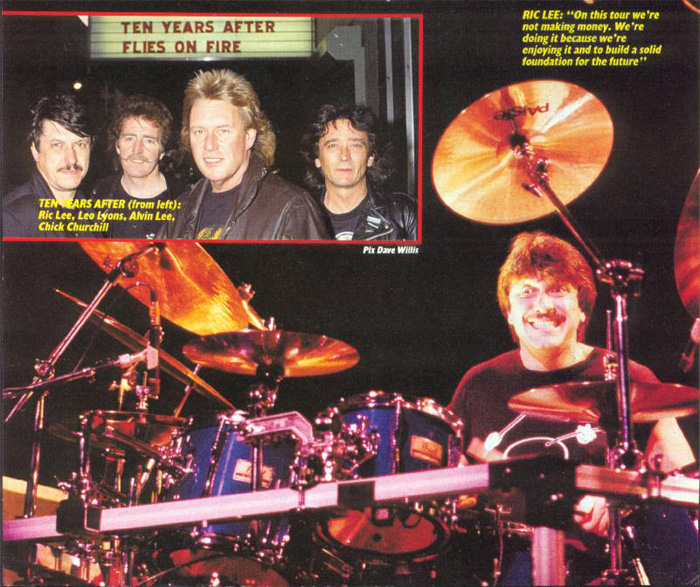
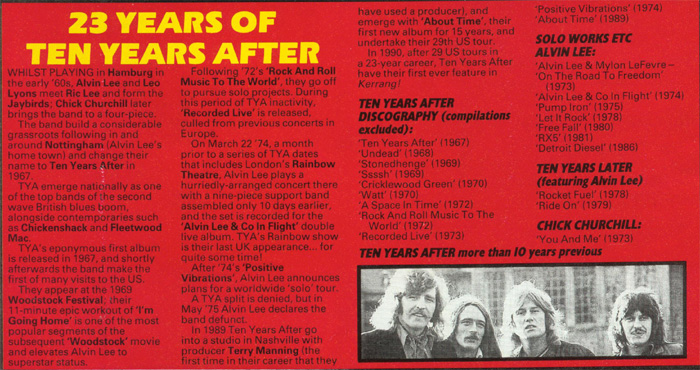
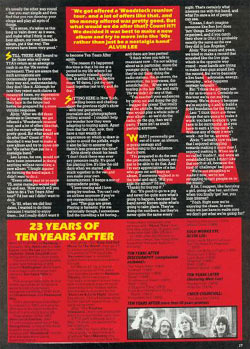
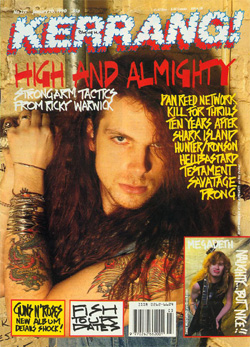
|
|
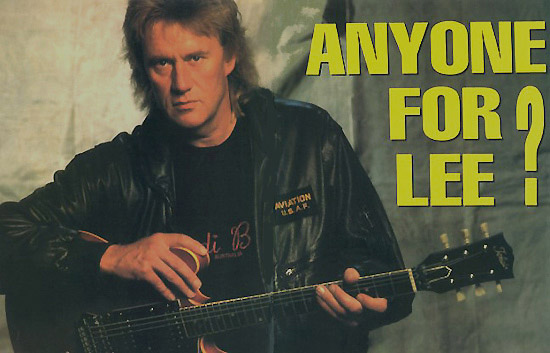
From RAW
Magazine
Issue from January 24 to February 6, 1990
An interview where Alvin discusses playing at
Woodstock and
Jamming with Jimi Hendrix.
Some years after Ten Years
After called it a day,
They're back again and perhaps
surprisingly, being
greeted with positive applause for their
most recent
record album called "About Time".
Veteran guitar slinger Alvin Lee looks back, forward
and
sideways with our Sylvie Simmons who catches
his bluesy drift.
ANYONE FOR
ALVIN LEE?
It's three in the morning, an
ice-cold New York night, the bars are closed, the bottle's
getting low, and there's a witch sitting on the hotel bed.
Long black hair, wigged-out eyes and a nice line in cosmic
witchie patter. We'd just been out on the street talking to
Ten Years After in their tour bus, Carole the publicist, Paul
the Rock writer and I, after their pile driver performance at
The Ritz club. And the witch, figuring we knew the band,
followed us upstairs and hid in the toilet. When she emerged,
she made a speech: she was not only a witch but Ten Years
After's biggest fan! She was baptised in the sweat flying from
Alvin Lee's snake-fingered solos! Her boyfriend, who refused
to come, actually is Alvin Lee, though temporarily living in a
different, dark-haired American body so as not to confuse
anybody. Ten Years After, she declared, had "changed her
life".
Well it was a hell of a show,
raw as a chill-blain in stilettos, equal parts virtuoso
experience and unbridled energy .Funny business, all these
ancient bands reforming at the end of the last decade, and
such a large proportion of them playing worthy, seminal music.
Ten Years After's' About Time', their first album since 1974's
'Positive Vibrations', is their best album since '69's 'Shhh'.
Produced by Terry Manning of ZZ Top fame, RAW's Malcolm Dome
reckoned it was the album the Top should have made after 'Eliminator',
and I can't disagree.
15 years ago, after leading
the British Blues Rock boom, after an amazing 28 tours of the
States, Ten Years After dissolved. "We just stopped
touring," explains Alvin Lee. "We never hated each
other. Ever! When we packed it in we'd been eight years on the
road and we just got disenchanted. In fact we started getting
disenchanted after the "Wood stock" movie came out
in "1970". A lot of people said that made Ten Years
After, but in fact we were doing really good before then,
playing 3,000 to 5,000 five thousand seat venues. When the
movie came out, it was like the mega dome arenas and ice
hockey stadiums. We did that for a few years, but we weren't
enjoying it. We were originally an underground band, we
started playing clubs like The Marquee, real good gigs. Those
stadiums are totally wrong for music. You can't see the
audience, you don't get the feel. The sound just echoes around
those places, and we kind of lost heart. I don't even know who
brought it up first, but someone said, I'm getting fed up with
this' and everyone went, "Yeah, so am I". So the
honest thing to do was call it a day."
Alvin, then embarked on a
patchy solo career, the others gravitated towards more
behind-the-scenes roles in the music industry; producing,
publishing. They kept in touch saw each other four or five
times a year for a drink and when someone suggested they give
it another go after eight years, just for The Marquee's 25th
anniversary celebrations, they said, "Okay". Weren't
they worried that after eight years one of them might have
completely lost it, that the band wouldn't work? "In
retrospect," says Alvin, "maybe I should have
thought that. But for some reason I thought it was going to be
easy. We had two days rehearsal. We got together for five
minutes, chatted a bit to feel things out, but when we
actually started playing, the amazing thing was it sounded
exactly like Ten Years After! By rights it should have sounded
a bit different, but it was unmistakeably TYA." So why
didn't they stick around and make an album back in 1983?
"I thought somebody might pick up on us, but it was
definitely the young boys' time then. It was all haircuts and
baggy trousers, and we had long hair and tight trousers still!
I don't know. No-one seemed to want us."
But when, in '88, it appeared
that someone did, they jumped at the chance to reform,
becoming one of the many veteran acts trotting the boards
again. "I think part of that is the Stock, Aitken &
Waterman formula-singles thing. It's getting so boring now.
There's not the kind of music you can actually go and get
excited about in a live situation. Some of the bands don't
even play live, they use tapes on stage. That's dreadful. And
other bands, the better bands, are just performing their
albums on stage. "The thing, I think, with older bands is
there's more jamming, more interplay. Ten Years After, Rolling
Stones, you can see the concerts and hear the same numbers but
they never sound quite the same, they're always changing, and
it doesn't get boring. "We've always tried to make our
albums sound like live gigs, whereas a lot of bands try to
make their gigs sound like the albums. " Also, I think
some of the younger kids today look back to that kind of 60's
togetherness thing, the peace movement, the anti-establishment
thing, and they're saying, 'I wish we could have something
like that'. Something to pull them all together."
Something, I suppose, like
Woodstock, the festival that made TY A US superstars.
"Woodstock was an accident," says Alvin. "It
was disorganised and that's what was great about it. It was
never meant to be that big of a deal. It was declared a
National Disaster Area wasn't it?" he laughs. "To me
the star of Woodstock was the audience. "I've got a
jumble of memories. The most vivid is the journey in, because
we could only get within about ten miles of the site and no
nearer, the roads were all jammed. So we bundled into an army
helicopter with an open side and I had a safety harness on. I
was dangling out of the helicopter over half-a-million people.
"Backstage, there was a lot of politics and bartering
over who was going on before who. I didn't get involved in it.
I went for a walk around the lake and joined in with the
audience and saw it from the other side of the stage. It was
great. No one knew who I was, but people were offering me food
and drink being really friendly. There wasn't so much
camaraderie backstage. There's been a "Maybe it was the
age we all were, but there seemed a lot more ego problems in
the "1960s" lot more of that kind of thing between
different bands since Live Aid.
Like the "Guitar Speak" thing that I did" the
Night Of The Guitars tour in 1988, starring Alvin Lee, Leslie
West, Steve Howe and the rest, Alvin says, "that was a
load of fun...and, guitarists are renowned for not getting
along! "There were ten lead guitarists on the bill, and
it was great. Maybe it was the age we all were, but there
seemed a lot more ego problems in the 1960's."
So, what were the egos like
when Alvin jammed on stage with Jimi Hendrix one legendary
night in New York?! "He was so far out that I never even
tried to compete with him! He was too far out for me to even
comprehend. Like he was on his own channel and everyone else
was on theirs. And he was a larger than-life guy as well with
that kind of aura about him. I think he once said he was from
Mars," he laughs, "and I thought maybe he was.
"He's left-handed so he couldn't play my guitar, so he
took Leo's bass and played it upside-down. But he wasn't
playing bass. He started playing lead bass and taking over. It
was so incredible, we actually just stopped and let him carry
on, and he kind of went off into outer space. He took a guitar
and went twenty steps further than I've ever heard it go."
And, so to the new album.
Were you worried about the original TYA feel living on after
so long? "No. But, there was a danger sticking with the
roots that it would sound old-fashioned. I think Terry Manning
helped a lot. He encouraged us to keep it simple. And, as for
the ZZ Top comparisons: " A compliment indeed! I thought
'Eliminator' was a great album. In fact when I first heard
"Gimme All Your Lovin" I was upset, because I
thought, 'Why didn't I write that?" There's one track on
our album called "Judgement Day" and the intro
sounds just like ZZ, that Billy Gibbons guitar sound and the
way he played it. I got to the end of the song and said to
Terry , "That sounded like ZZ Top did it? You're going to
get the blame for this as the producer!'."
Yeah. But, what the hell…
|
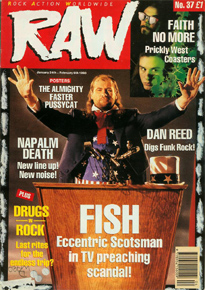
|
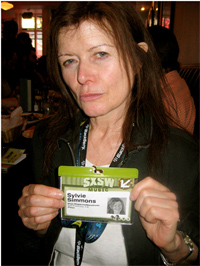
Sylvie Simmons |
|
|
The "About
Time" Tour
|
January
27, 1990
Ten
Years After –“Storm Back” !
Odeon
Hammersmith Concert
After
playing shows in Germany, and described by the
fans as “Sensational”, and the best they’ve
been ever ! Ten Years After come storming back to
play at the Odeon Hammersmith, London
on January 27.
It
will be the all-time classic boogie band’s first
major UK appearance since 1974. The band features
the original line up, of Alvin Lee (Guitar and
Vocals) Leo Lyons (Bass Guitar) Chick Churchill
(Keyboards) and Ric Lee (Drums).
They
very recently released their critically acclaimed
album “About Time” on Chrysalis, and have just
completed a successful tour. The Hammersmith gig
forms part of a full European Tour. Tickets are
priced at 9.50 and 8.50
|
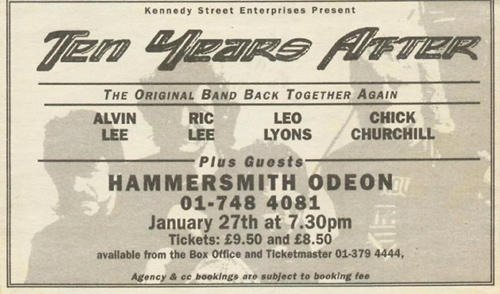
January
1990
|
From
January 27, 1990 Ten
Years After – Live At The Odeon Hammersmith
London
Article
by – Pippa Lang
Why
oh why did Captain Speed Fingers never make it
mega ?
Mention
Alvin Lee’s name and most people still have to
think a bit, before remembering the famous “Ban
The Bomb” Fender Strat of Woodstock. (It was a
Cherry Red Gibson ES-335).
The
straight blonde hair, the long face, screwed up in
exquisite concentration, squeezing out the sparks
for that unrepeatable rendition of “Going Home”….that
was a long time ago
(The
Woodstock Movie) came out after the 1969 festival).
But nothing changes, thank God!
We
are witnessing a time warp situation; and putrid
smell of Afghan mingling with the musky whiff of
patchouli oil. Love and peace man!
I’m
sitting in the balcony with a grand stand view of
our Alvin Lee giving his inimitable treatment of
“Good Morning Little Schoolgirl”, Leo Lyons
bass, throbbing through the floor beneath my feet
and setting up a rhythm for the hordes to stomp
along to. “Going Home” is still a classic,
after all these years and twenty years later, the
Fender is still capable of extraordinary
acrobatics. (It’s a Gibson ES-335 – not a
Fender). The Ban the Bomb sticker is still there,
a symbol of everlasting values. This is simply the
best time that I’ve had in ages. Surrounded by
hippies and heads, without a self conscious bone
in their bodies, they are going ape-shit. Some are
weeping. We’re going to do “Can’t Keep From
Crying Sometimes” next.
Our
hero smiles warmly and the hippettes are
hysterical. Alvin’s guitar gently weeps.
“Choo-Choo-Mama”
the legendary set-ender nearly demolishes
the Hammy – Odeon !!!
There
is a mass boogy-ing on the seats, a mad flurry of
activity and an undulating sea of hair.
It’s
been almost eighteen years since Alvin Lee, Leo
Lyons, Chick Churchill and Ric Lee have played
together in one unit. A few experimental outfits
in between, never really made it. As it’s taken
this long for the four of them to realise they
can’t do without each other. And judging by the
reaction tonight, there are a fair few thousand
who can’t do without the band either. Let’s
hope it doesn’t
take another eighteen years before we get
to here “I’m Going Home” live again.
|
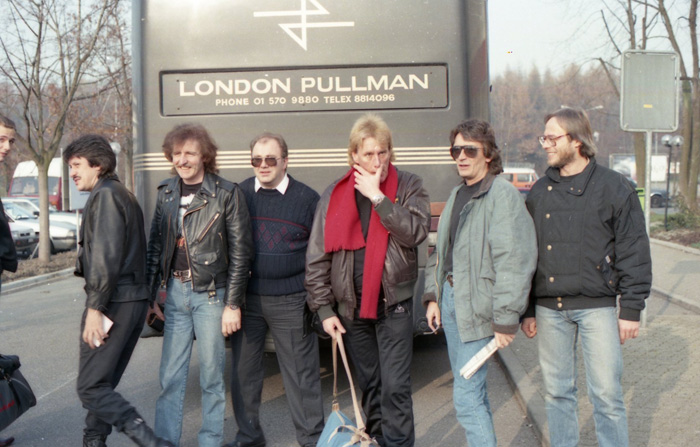
TEN YEARS AFTER, John
Hembrow, Andy Jaworsky
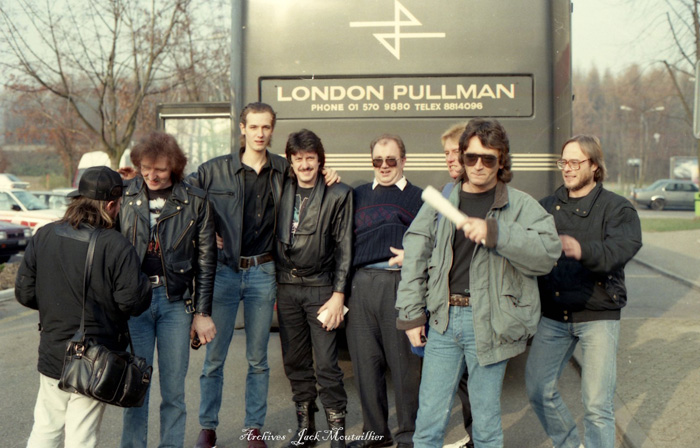
Photos by Jacky Moutaillier
contributed by Christoph Müller
8 March 1990
- Evening Post Nottingham
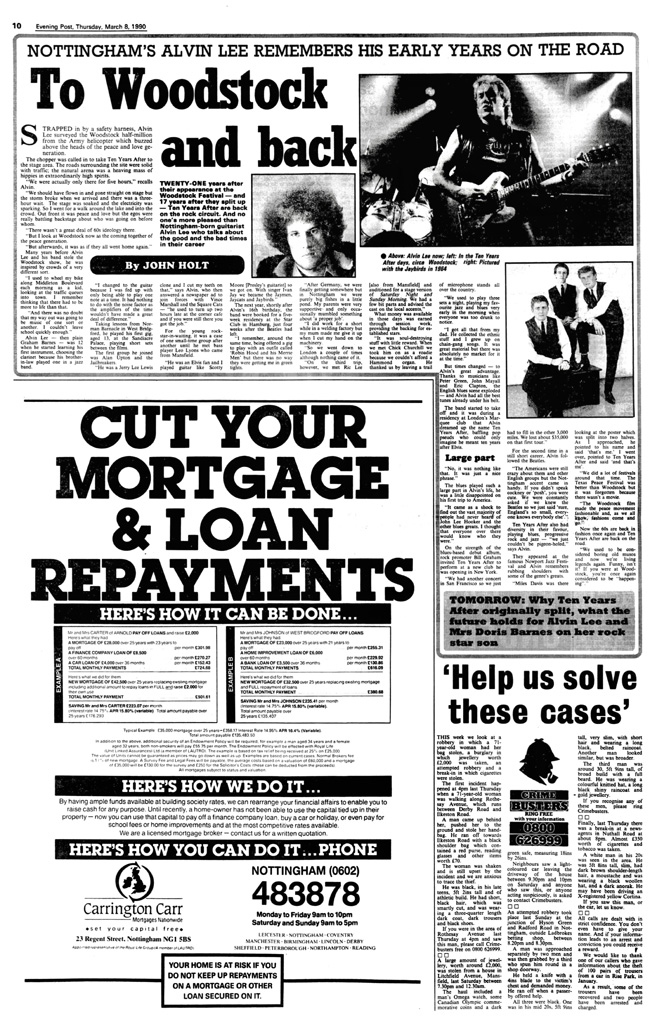
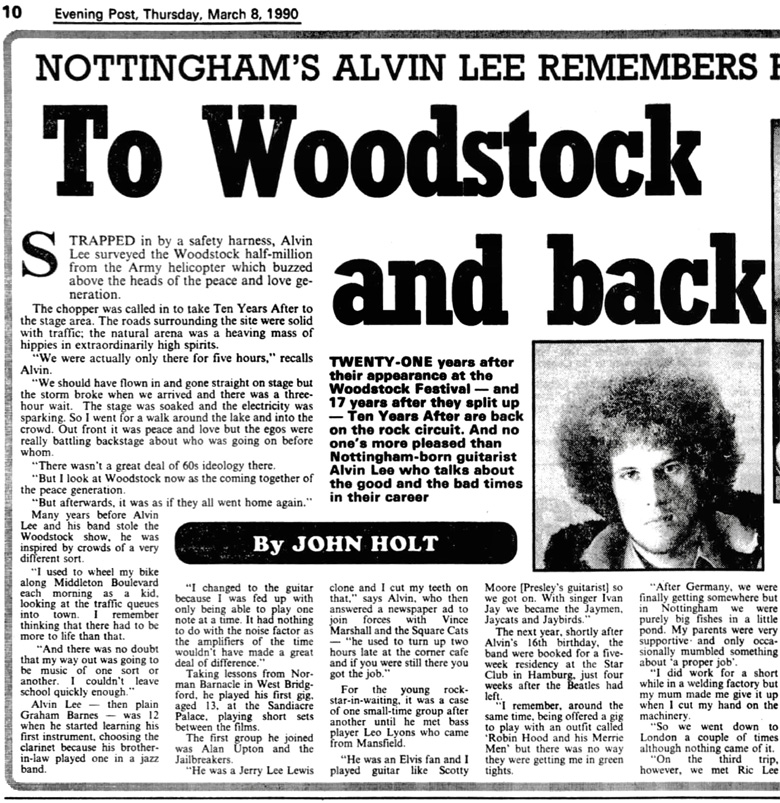
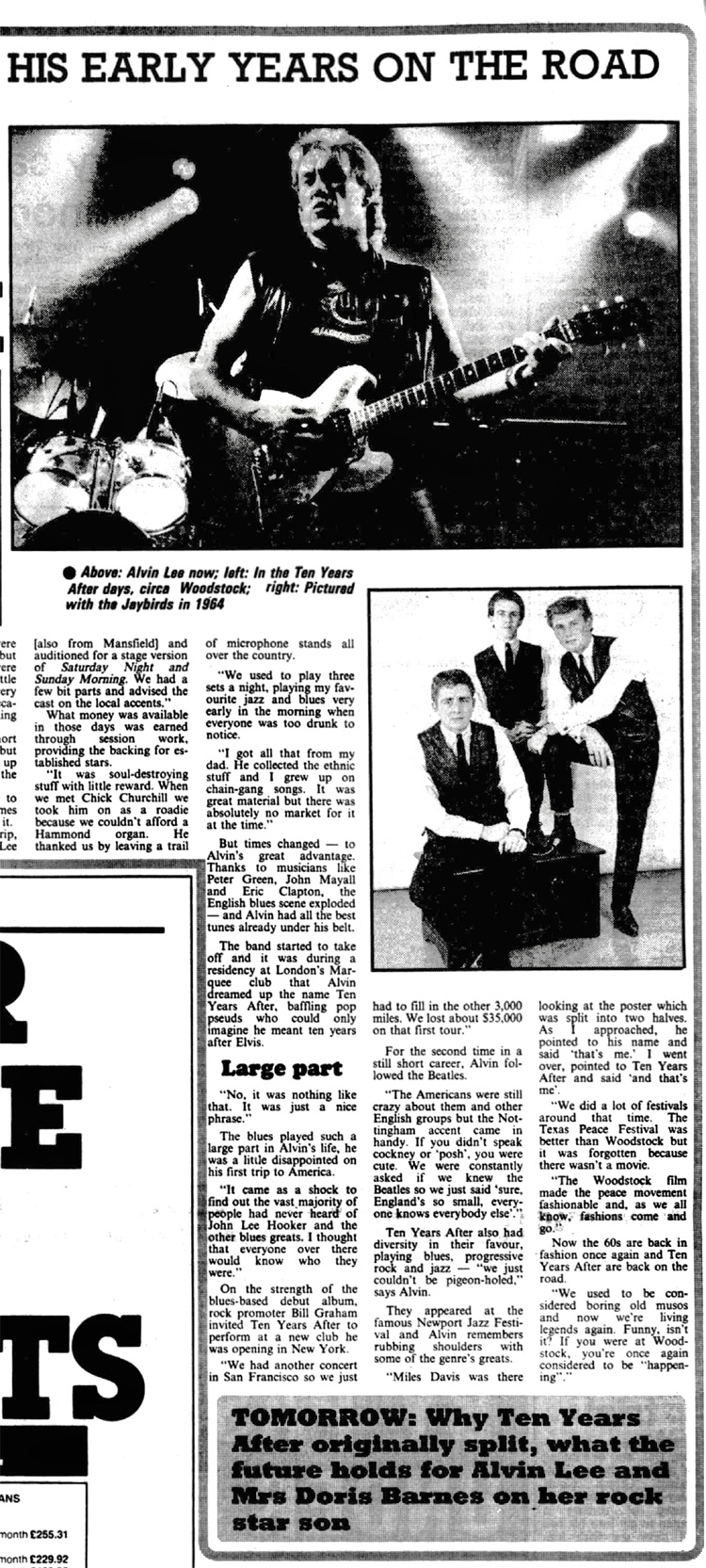 | |
9 March 1990, Evening Post Nottingham
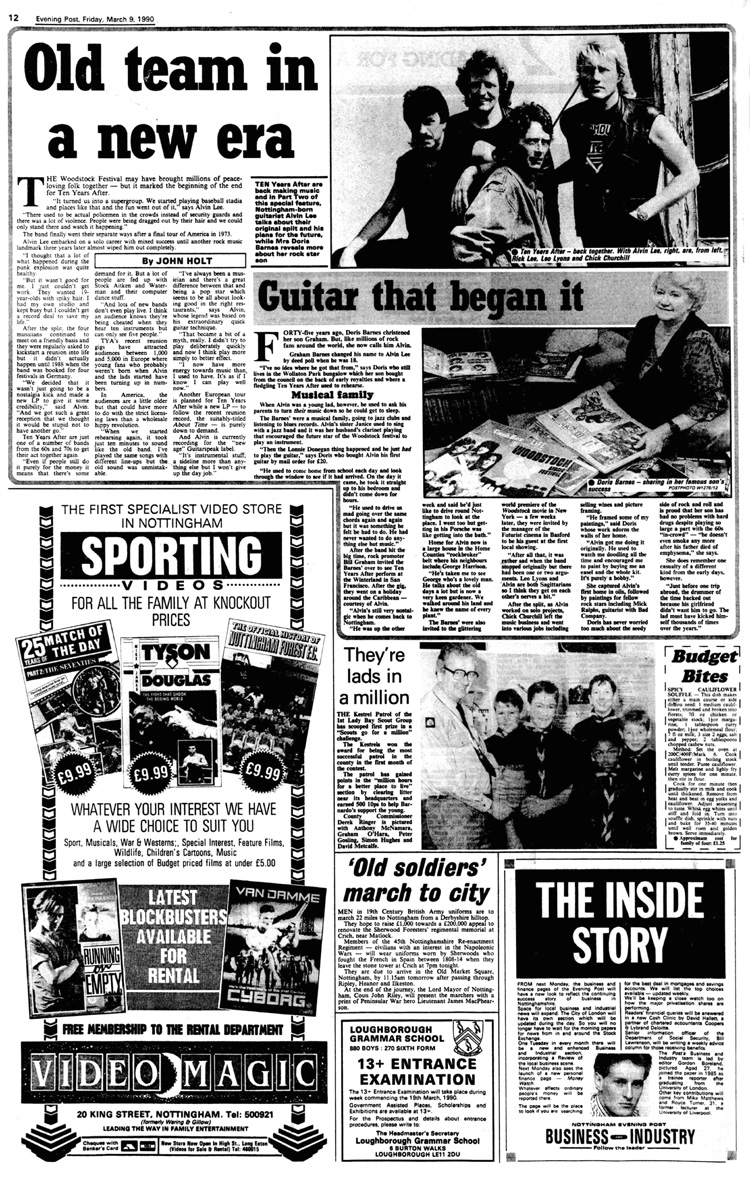
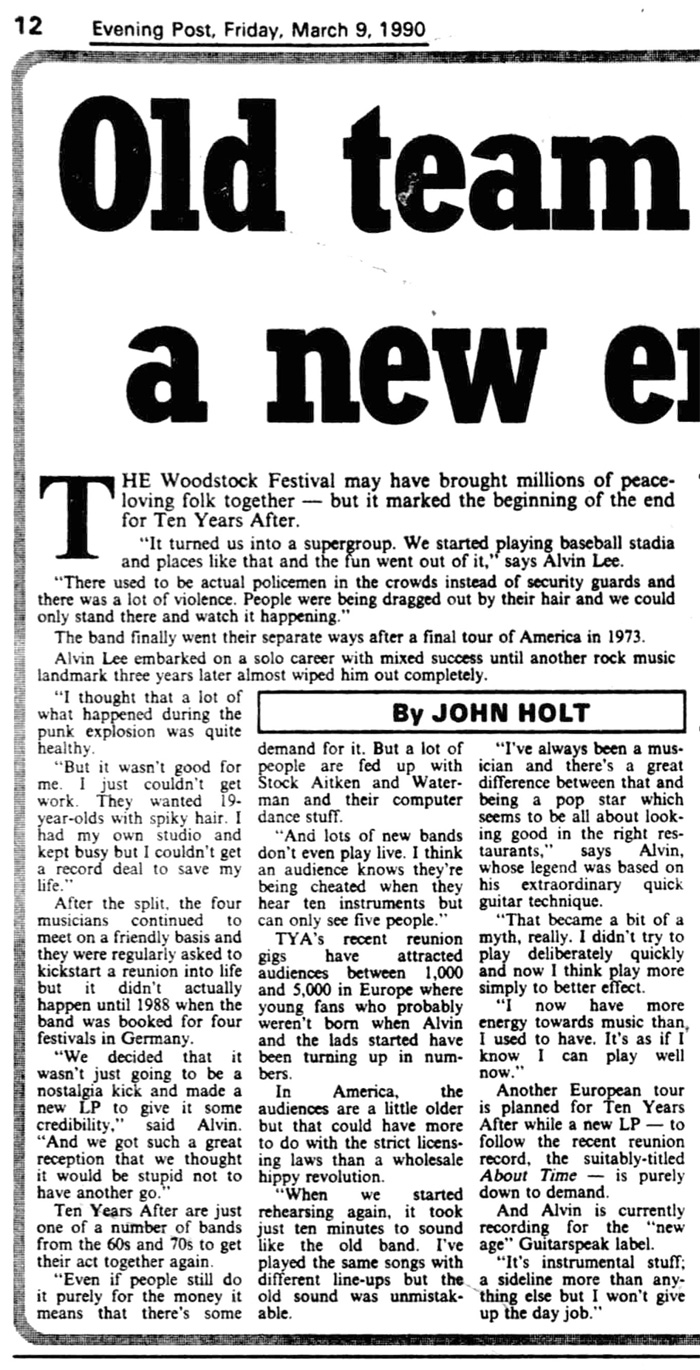
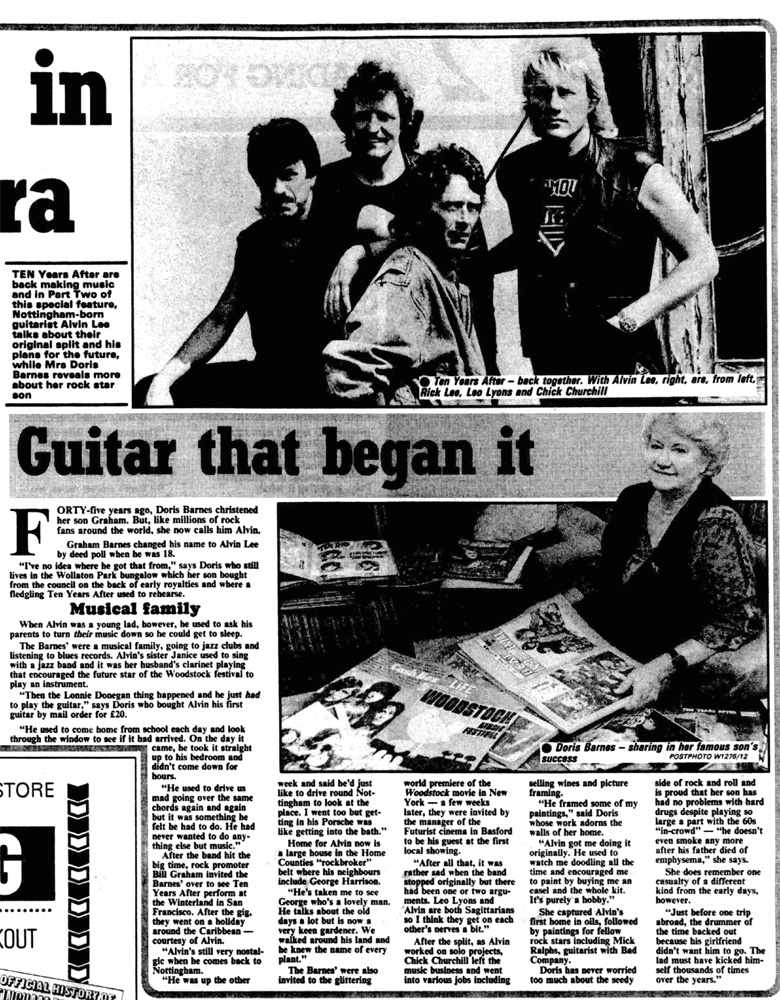
Contributions by Christoph Müller, well appreciated
|
From
Metal Hammer Magazine
Ten
Years After – “Live Legends” – Castle
Music - 1990
“This
is not heavy metal” said Peter Burtz our
esteemed editor of the German Metal Hammer looking
in shock and horror at the video cover. So fucking
what! This is Rock music and about a million times
better than most of the complete crap that calls
itself thrash and metal! Here are real musicians,
playing great riffs and blues like “Good Morning
Little School Girl” the tearaway “I’m Going
Home” and Chuck Berry’s Classic “Sweet
Little Sixteen” and “Johnny B. Goode”.
Get
back to the roots and enjoy some unpretentious
blowing at the hands of Alvin Lee (Guitar) Ric Lee
(Drums) who is featured on his famous drum solo
called ”Hobbit” Ric blast away on top form and
so does Alvin, backed up by his old mates Chick
Churchill (Keyboards) and Leo Lyons (Om Bass
Guitar).
By
Chris Welch
|
|
Ten
Years After – Short Band Biography
From
The Hard Rock & Heavy Metal Encyclopaedia
Ten
Years After were one of the most important blues bands
of the 1960’s and early 1970’s. The band made itself
immortal with the classic “I’m Going Home”
especially with the version on the “Woodstock
Festival” from 1969. Leo Lyons, Alvin Lee and Ric Lee
had not the slightest idea of when they formed the
“Jaybirds” in 1966 to set up a new project with
keyboard player Chick Churchill. The quartet took up the
blues and were successful from the second album. “Undead”(
which contained the original version of “I’m Going
Home”).
The
most important characteristics of the Ten Years After
albums from that period were Alvin Lee’s unstoppable
guitar solos, which were super fast for that period.
On
“A Space In Time” the band suddenly started to
experiment, because it was tired of the “I’m Going
Home” success. The material became quieter, the
rhythms on the contrary became stranger every time. Solo
aspirations got the upper hand. Alvin built his own
studio and recorded an album with the American vocalist
Mylon Lefevre and also Chick Churchill produced one
album under his own name. Ten Years After reunited one
more time after the album “Recorded Live” 1973 –
for “Positive Vibrations” 1974; after that, the
members of the band took up solo careers. Chick
Churchill started to work for Chrysalis Records (back
then it was Ten Years After’s record company). Ric Lee
started a production company and Leo Lyons produced
bands, such as “UFO”. While Alvin Lee was the only
one who stayed active as a musician. First as a solo
artists, and then with the band “Ten Years Later”
1978-1979. again on his own and finally another time
under the name “Ten Years After”. A concert on the
“Reading” Festival was still feasible for the
original line-up. But on other concerts which he gave
under the name “Ten Years After” he was assisted by
musicians who were so young that they did not experience
the heydays of Ten Years After. But in 1990 the original
members got back together for a very successful U.K. and
German dates and went down a storm.
|
|
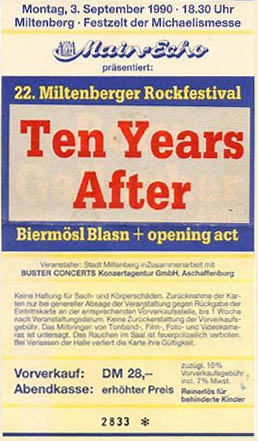
|
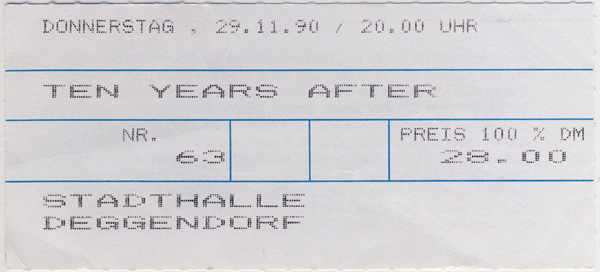
I saw Alvin Lee with Ten
Years After in Deggendorf (Niederbayern) at
29th November 1990 and it was a great Concert.
The townhall of Deggendorf is not very large,
but Alvin was excellent and showed us his best
performance. I hear Alvin Lee and TYA since I
was 10 Years old. My older brother bought the
album "Undead" I think in 1969 and since then
I love Alvin and his music. I bought all the
LP's and CD's and Alvin is my favourite guitar
player for ever. I love the sound, his solis
and his voice
Our thanks to
Franz Harles for sharing his memories with us
|
| November 30, 1990 –
Weser Kurier Zeitung
Heim nach Woodstock – „Ten Years
After“ trotzten im Aladin allen Trends
Es scheint noch Spaß zu machen.
„Ten Years After“ – Bassist Leo Lyons, wie seine drei
Kollegen flott in den Vierzigern, grinste verdächtig
oft, während er mit gelenkigen Fingern seine
Bassfiguren zupfte. Der Engländer hat sich kaum
verändert: seinen Schnauzer wie damals, die Haare lang
genug, um sie schütteln zu können. Sänger / Gitarrist
Alvin Lee sieht man trotz Lederhose und Weste schon
eher die Jahre an. Auch die Stimme ist nicht mehr
hundertprozentig auf der Höhe. Wenn er allerdings in
die Saiten greift, verklärt das den Blick allemal
soweit, dass man sich zwanzig Jahre zurückversetzt
fühlen kann: in goldene Zeiten, als der Begriff
„progressive“ gültiges Schlagwort für Heavy –
Psychedelic – und Bluesrock zugleich war. „Ten Years
After“, im Gegensatz zu vielen anderen so genannten
Reunions, komplett in Originalbesetzung, wissen was
das Publikum erwartet. Für gutes Geld gibt’s den Sound
von einst, auf solidem Niveau mit allen gewünschten
Schikanen. Zwei moderate Rocknummern zum Aufwärmen,
dann legt Alvin Lee unter dem Wiedererkennungs-Jubel
der Menge das Riff zu „Good Morning Little Schoolgirl“
vor. Die Gitarren–Licks kommen, wie’s der Alt-Fan in
Erinnerung hat. Bei dem Wort Blues in der folgenden
Ansage jauchzt der halbe Saal. Nicht fehlen darf ein
Stück mit fünfminütigem Schlagzeug-Solo. Noch etwas
mittelmäßiger als Ric Lee schon anno 70 trommelte,
aber herrlich unzeitgemäß.
Im Laufe des Abends zitiert sein
Namensvetter auf der roten Gitarre - Canned Heat - Jimi Hendrix – Deep Purple – die
alten Weggenossen. Selbst die zahme „Johnny B. Goode“
– Version erntet frenetischen Beifall (Schubert ein
biederes Hard Rock–Unternehmen aus Tirol handelte sich
zuvor für ein Rock `n´ Roll Medley nur müde Klatscher
ein). „I Woke Up This Morning“ in
schwerer, urbritischer Bluesrock–Manier , „Love Like A
Man“, ein ellenlanger Titel mit Gitarre–am
Mikroständer–Instrumentalteil, dann ist der Höhepunkt
erreicht. „Now wie take you back to
Woodstock“. Wen stört da noch, dass „I’m Going Home“ altersbedingt an
Tempo eingebüsst hat. Die Stimmung stimmt -
Rock –Nostalgie
pur.
Scha |
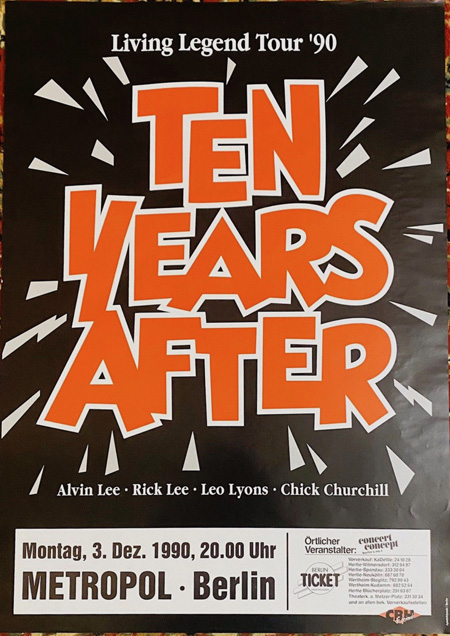
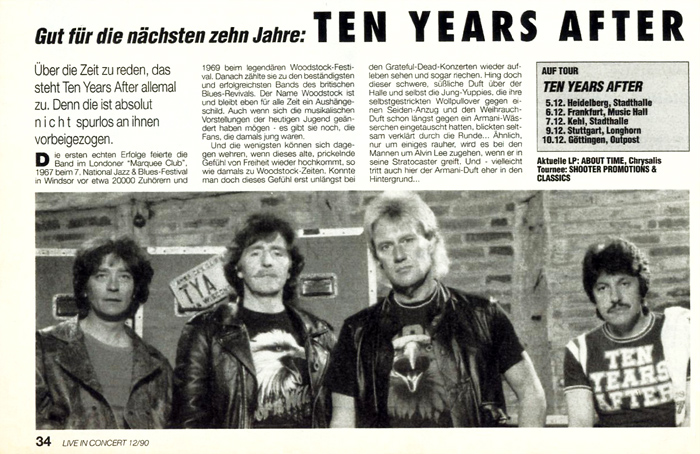
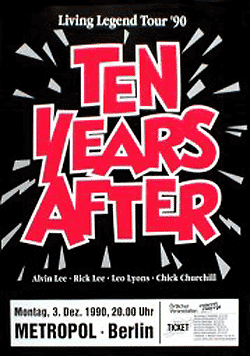
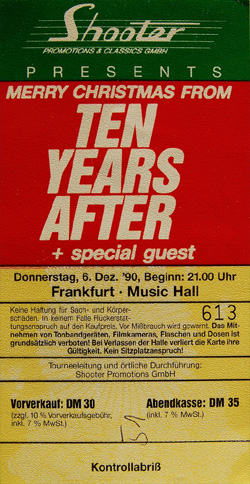
|
|
|